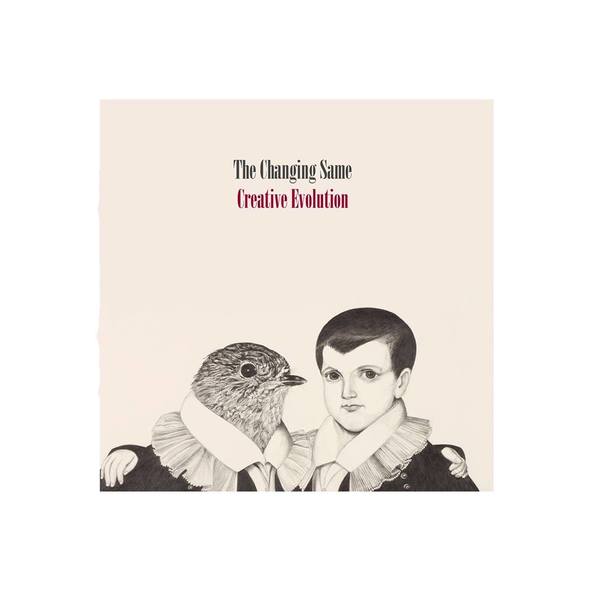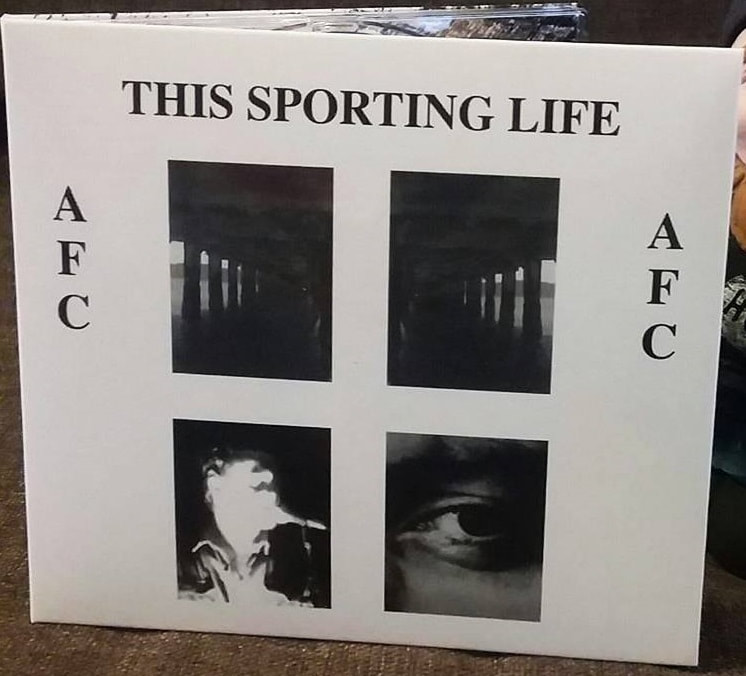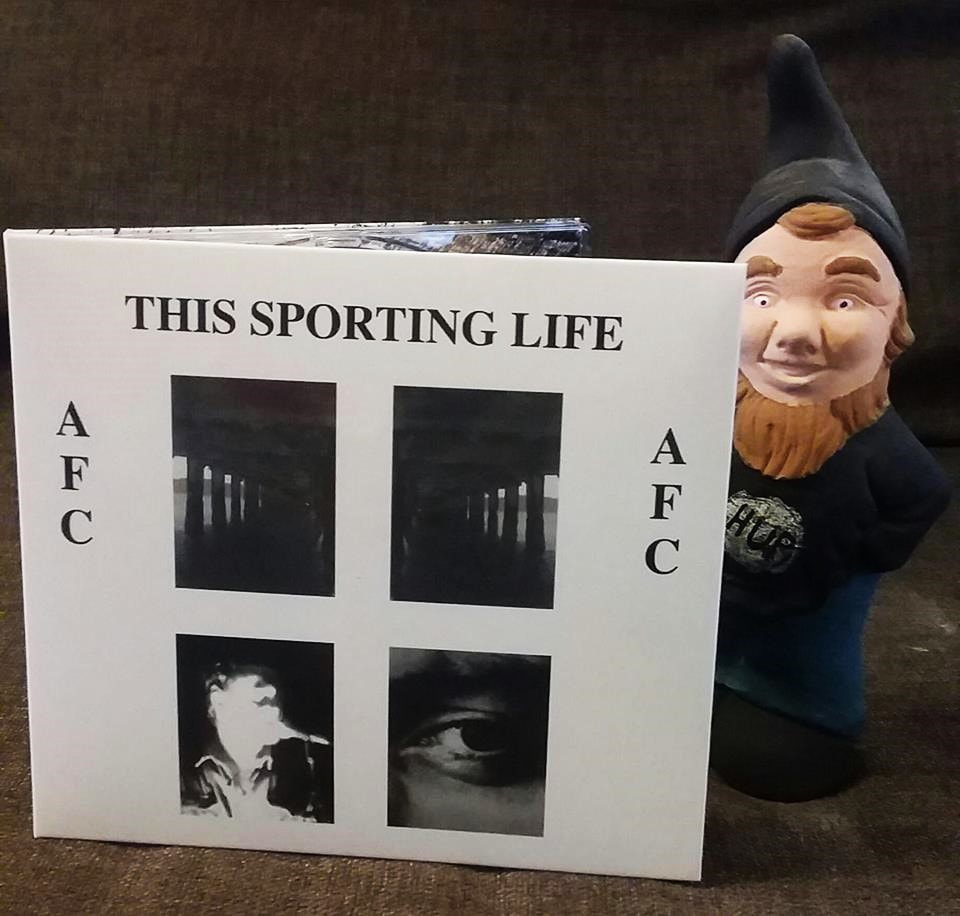|
I N T E R V I E W The Creative Evolution of the Changing Same: and Interview with Matthew Bannister with Ian Duggan The Changing Same are releasing their second album, ‘Creative Evolution’, with a release party on September 5 at Nivara Lounge. We had a quick chat to Matthew Bannister about the points of difference between this and his other band, Sneaky Feelings, the evolution of The Changing Same through time, and more!
HUP: It’s been seven years since the release of The Changing Same’s self-titled debut, and four since the ‘Make up my Mind’ EP. While there was a lot of continuity between those releases, can you explain what has changed for the band between then and now, both member- and sound-wise? Matthew: There’s four of us now, with Mef Storm on vocals and acoustic guitar. He’s also writing songs. So that adds a new sound to the band, vocals and composition-wise. At present we also have John Maydon on bass and Bruce Dennis on drums (bass and drums on the recordings are Albert Bannister and Stan Jagger). HUP: You have been working with both Sneaky Feelings and The Changing Same over the last few years, with the Sneaky Feelings’ album ‘Progress Junction’ released just on a year ago. How do the two projects compare, or differ, in your mind? And how do you decide what song should go with which band? Matthew: With the Changing Same I had plenty of time to try out different songs and see which worked. With Sneakies, it was more of a gamble, given that we had limited time together. I chose stuff that I thought was pretty straightforward, or that would benefit from a dual electric guitar line-up. It worked out well. We’ve started a new Sneakies album, but this time I chose songs that were a bit weirder, which didn’t work so well. Should still be able to make my quota though – the deal is three songs per person, making 12 in total. HUP: The album is titled ‘Creative Evolution’, while your band name is ‘The Changing Same’ - continuity within a changing form through time. Is the album name a play on the band’s name, or was it devised independently? Matthew: ‘Creative Evolution’ is originally a book by philosopher Henri Bergson. There is a continuity in that both names allude to ideas about time and change, which is a preoccupation of mine. HUP: I really love the cover art, featuring the bird and the boy. Is there any story behind the cover choice? Matthew: The artist is a friend of mine, Margaret Silverwood, from Wanganui. I just like her stuff and trusted her to come up with a cool image. I didn’t brief her other than tell her the title. HUP: What are your aspirations for The Changing Same, overall? Matthew: To keep going, basically. I just like being in a band with other people. I look forward to recording some of Mef’s songs. I don’t want to be in the spotlight all the time. I have another Beatles cover project, Rubber Gold, that I’d like to promote with gigs, next year. HUP: What are you doing to promote this album? Matthew: We’re doing a show at Nivara Lounge, Hamilton, on Wednesday September 5, and in Auckland on Saturday September 8 at UFO. HUP: How can we get hold of the album, and what formats is it available in? Matthew: CD from Powertool Records. It’ll be on Bandcamp too.
1 Comment
I N T E R V I E W
MSMR101: An Interview with Dr Mesmer's Private Army with Ian Duggan
It's only a few days until the 10th Annual Circle Jerk! One band making its first appearance at the event is Dr Mesmer's Private Army. We talked to Kent Macpherson (Octave guitar/synth/field recordings) about the concept behind band's performances, aspirations, and the story behind their name.
HUP: You are not a typical band. Explain to us how a Dr Mesmer’s Private Army performance works. Kent: Every show we do is improvised. We have been together for 2 years and had our first rehearsal last week! That was because we needed to figure some riffs and motifs from other bands to weave in to our set. Every show we have done has been in the key of A minor. It provides us with a simple framework to escape within. Our shows are freeform with no breaks. There are ebbs and flows, dynamic shifts. Slow and hypnotic. HUP: The concept of the band appears in many ways similar to that of ex-Hamilton band ‘Grok’, with the improvisational nature of the recordings. What was your inspiration for the concept? Kent: Jeremy [Mayall] and Kent [Macpherson] spoke about this concept of live ambient improvisations influenced by the avant classical soundscapes of artists like Nils Frahm and Olafur Arnalds, utilising pianos, guitars and electronics alongside field recordings. Both of us have been interested in the idea of incorporating a visual aspect to a somewhat static onstage musical performance. Yotam [Levy; cellist] is a rare breed of classically trained performers who is comfortable with this chaos and calm. HUP: You have released a number of recordings via Bandcamp this year, made up of different live performances, and a studio album called ‘Introductions to the Cosmos’. For someone wanting to experience the band, what track would you suggest for them to go and experience first? Kent: Dawn 1 is a very good introduction to what we do. It's an early recording for us but captures us in fine form. HUP: The band has been active for just over two years. How many performances have you done in that time? Is the project becoming more serious through time? Kent: We have done about 15 shows we think. It is semi-serious as all of us have our professional lives outside of it. We all love to hang out and do shows. We don't take ourselves too seriously and truly enjoy the challenge of being in the moment and taking an audience with us on an audio-visual journey through space and time. HUP: Do you have aspirations for the band? Kent: We are very keen to take the group to the regions, and in particular, primary and high schools. We recently played to around 100 year 4-6 students at Woodstock Primary School in Hamilton. Their minds were totally blown! We did a Q and A after our performance and the students asked some truly inspired questions. We love playing art galleries and outdoors. We are looking at playing through water at some stage, whilst our audience listens whilst floating above underwater speakers. HUP: What is behind the name, ‘Dr Mesmer’s Private Army’? Kent: Paul's (visuals) partner came up with it. The word mesmerise is named after Dr Mesmer, who was actually a real person! None of us really know what it means but it does have a certain cryptic nature to it, which we love. Visit Dr Mesmer's Private Army's Bandcamp page HERE A R T I C L E Interview with This Sporting Life – Alms for Children with Ian Duggan A number of years ago I bought the compilation “It's Bigger than Both of Us (NZ Singles 1979-82)”, and one of my favourite songs quickly became ‘Danny Boy’ by ‘Alms for Children’. But, like I imagine is the case for many others, that pretty much became my entire experience of the band. A little later I bought another wonderful little compilation called ’Biding our Time’, released by Failsafe Records, which included a song called ‘Point to Point’ by ‘This Sporting Life’; that cassette got well and truly thrashed in my Walkman and, again, ‘Point to Point’ was a favourite. It wasn’t until I received the new release, ‘This Sporting Life - Alms for Children’, that I finally made a connection between the two intimately connected bands. This release compiles the released, and previously unreleased, recordings from these bands into a single CD or digital download. We talked to members Ben Hayman (bass) and Daron Johns (drums) about the release of the compilation, how they feel their songs have stood the test of time, memories of their time together, Hamilton gigs, and more! HUP: You started out as ‘Alms for Children’ in 1980, disbanded, and then reformed as ‘This Sporting Life’ until 1984. Both bands largely had the same personnel, except for a short period in the transition period. Firstly, how have you come to be releasing the new CD, compiling all these recordings? TSL: Rob [Mayes] from Failsafe tracked us down and said he had always wanted to do a release of all our material. A bit of a bookend to the Failsafe label and the fact that he named the label after a song on our first 7” [Fail Safe off Alms not Arms]. HUP: It has been 34 years since ‘This Sporting Life’ disbanded. When you listen back to the songs on the compilation, how do you feel about them now, all these years later? Which songs do you feel stand up the best? TSL: The first 7”, [Alms not Arms], is probably the release we are all most fond of. It’s a less thought through approach to making our music because we were that bit younger and had less of an idea of what we were aiming for. It was just a bit more energised maybe. Back in the day though, we all felt a bit sheepish about the song Danny Boy that’s on that first record. Maybe because it’s the one that was seen as the A side, and then was the one that got air time as it charted. All these years later I think we feel ok about even that track now. 1981 is a long time ago… The songs we played with two bass guitars, or when Paul and Ben [Fogarty] swapped bass and guitar duties were always memorable because we shook the sound up. ‘Total Loss’, with the two basses, being a bit of a favourite out of those. Sometimes we wish we had recorded the This Sporting Life album on something bigger than four track, but at the time, it was the right thing to do. And if it hadn’t been for studios like Lab and Chris Knox’ trusty Tascam, a load of us would never have made vinyl at all. Some of the live tracks that have come out of the woodwork we had totally forgotten about. They were recorded by people in the gigs on cassettes or off the mixing desk to cassette. It is unfortunate that there are no more Alms for Children recordings, but we are just grateful we have managed to save this lot. [continued below] HUP: What was behind the name change? With name recognition being important, do you think in hindsight it was a good decision to make the change, especially considering ‘Danny Boy’ had charted, and the ‘Alms for Children’ moniker would have been fairly well known? TSL: We never really thought anything much through in those days to be honest. We simply started a band, played, got some people that liked coming to see us and then stopped. The concept of recognition or building anything ongoing was never in our minds. We played because we kind of had to. It was important to having a sense of being part of something - anything. AFC stopped for a bunch of reasons that happened at the same time - Daron wanted to move back to Christchurch for a while, we might also have been over doing the gigs a bit (I recall it was pretty full on), and we’d started to become ‘a band with a sound’. What I mean is that we had created something and I reckon we needed to work out if it was a thing we wanted to continue. Paul and I were listening to quite different stuff and I reckon we were trying to figure out if this band was the right container for whatever happened next. We spent some time not playing and then decided to try a different thing for a while with a different drummer. That led to us creating a new band in our heads that we then called This Sporting Life. Then a while later [AFC vocalist] Gary [Charlton] joined, and then after just one show Phil Jackson who was drumming with us left and Daron joined to pickup the sticks. So in many ways it was a new band rather than a name change – its just that all of AFC eventually signed up for it! HUP: I’m sure the release of this album has led to a lot of retrospection. What are some of your favourite memories from your times together? TSL: Yeah a ton of things are coming back. It’s been the best part of doing this. We’ve connected with a few people and a bunch of stories that had been lost. Playing with The Chills and The Clean and so many others at places like the Rhumba Bar, [Auckland]. Getting to play at Christchurch Town Hall and Christchurch Uni, and Mainstreet in Auckland with The Fall is a big one. A venue that was always a bit intimidating and strange was the Reverb Room at the Edinburgh Castle pub on Symonds Street. Pretty sure we played there with Nocturnal Projections and Childerns Hour. We had a rehearsal studio in the cellar under it that you could only just stand up in and was shared with Dance Macabre. A New Year’s visit to New Plymouth sticks in the memory as well. The New Year’s Eve event was in a huge warehouse. [The Herco Pilots’] Harry Ratbag was MC and a bunch of people played including Fetus Productions, Verlaines, Childrens Hour, [and] Chris Knox. It was a bit chaotic in the crowd but a great weekend. It was a really productive time for New Zealand independent stuff; Bands, Comics, Design, Radio, Venues all sorts. It seemed everyone was starting something. We all had jobs as well as the band. And sometimes that was super useful like the fact Daron was a printer – posters and covers resulted. Ben worked in a stationary warehouse so an envelope was used for the covers for the first 7”. HUP: Both bands were based in Auckland. Did you ever make it down to play in Hamilton, and if so, do you have any particular memories of playing here? TSL: Memory is in short supply about a lot of that time. So long ago, but yes we did play in Hamilton. At a farm. It was a day time gig in the outside if I remember right. We also played Hamilton Uni with Childrens Hour, and think that was Children’s Hour’s second ever gig. [continued below] HUP: How well have the band members kept in touch since the split of ‘This Sporting Life’? TSL: Gary, Paul and Ben all moved to the U.K. in the late ‘80s and Daron to Sydney. Paul and Ben saw Gary a couple of times in the first few years in the UK before he moved to Australia and everyone lost contact. Fifteen years later Paul and Ben reconnected. Being in the UK they had the chance to go see some of the bands that influenced the early sounds of AFC – Wire, Magazine, Gang of Four and a bunch of newer bands. The odd jam session was had as well with Paul’s son playing drums. The two reconnected with Daron - who is based in ChCh now - around 2010, and then with Gary - still in Aus -in 2015. We have Rob Mayes at Failsafe to thank for giving us a really great reason to start talking again and its great – thanks Rob! HUP: Failsafe are releasing a lot of material over the next year. Included among this is ‘Beat Rhythm Fashion’, who are playing some shows to support their release. Are you planning on doing some shows to support your release? TSL: No plan as such; more a vague notion. We live on four different land masses now. It needs to work for everyones lives as well. We’d definitely all like to get together sometime as mates. If making sound was also involved then that would be great. If it’s looking like more than just a vague notion we will certainly let you know. HUP: How can we get hold of the album? TSL: The Interweb has got loads at Failsafe. Theres a download only version or you can get the CD package mailed to you. Please do – we need the encouragement. Also, if you are in Auckland and fancy a shop then Flying Out have some. In Welly, Slow Boat Records has some and there will also be some in Christchurch and Dunedin soon, and we will update our Facebook page once we know which stores. R E V E I W ‘This Sporting Life – Alms for Children’ compilation Former Christchurch, now Japan-based Failsafe Records have some pretty ambitious plans for the next 12 months, with the intended release of 25 albums. Having ‘This Sporting Life – Alms for Children’ among the first of these releases is highly appropriate given this is where the label’s moniker originated, and the Alms for Children song ‘Failsafe’ fittingly opens this compilation. While Flying Nun have been getting the press recently for archiving their master tapes in the Alexander Turnbull Library, the release of compilations like this – bringing together the collected works and live recordings of these inextricably intertwined bands from the early ‘80s – is every bit as laudable for its safeguarding of our musical taonga. Alms for Children and This Sporting Life existed in the ’81-’84 period, considered by many to be the golden age of New Zealand music. The opening tracks on the compilation belong to their Alms for Children period, with songs from the 1981 ‘Alms not Arms’ 7”. Following the B-sides ‘Failsafe’ and ‘Mother’, the original A-side ‘Danny Boy’ is included at track 3; this highlight will be familiar to many New Zealand music fans not around for the original release, due to its inclusion on the 1988 music compilation ‘It’s Bigger than Both of Us’. Most of the compilation is dedicated to ‘This Sporting Life’, beginning with tracks from their two Flying Nun releases, 1982s ‘Show me to the Bellrope’ mini-album and 1983s ‘In Limbo’ EP. If you are familiar with The Mekons 1981 single ‘This Sporting Life’, from which the band took its name, you will be in familiar territory among these songs. The compilation winds up with a series of live recordings, including one of the highlights for me, ‘Point to Point’ – again, familiar to many a New Zealand music fan through its original appearance on the fantastic early Failsafe compilation, 1986s ‘Biding Our Time’. Overall, this compilation provides an excellent document of a band whose music has slipped from public consciousness somewhat over the last 35 years, but whose songs are well worthy of both preservation and to be brought back to the forefront of the minds of lovers of New Zealand's post-punk music. While Failsafe are doing their thing, wouldn’t it be great if something similar could happen for Hamilton music? The seminal Orange Recordings 1989 cassette-only compilation Surf Music, for example, certainly forms a gaping hole in my Hamilton music collection; how great would it be if someone could delve into those music archives and release our music from that period digitally? In the meantime, I can’t wait to see what Falisafe brings us next! The ‘This Sporting Life – Alms for Children’ compilation can be bought via their Bandcamp or from Failsafe Records, as a digital download or physical CD. - Ian Duggan |
Archives
July 2022
Categories |





 RSS Feed
RSS Feed
